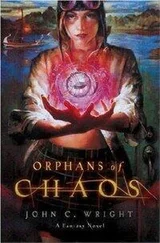He stared at his foe for a moment. Was there any point in talking? Floating in the transparent surface of the diamond parasol, which spread like a halo over Ironjoy's head, were the icons and display-boards indexing the contents of Ironjoy's thought-shop. The icons appeared in Objective Aesthetic sym-bology; Phaethon understood their meaning.
To Ironjoy's left were routines to suppress restless thoughts, to produce personas incapable of fatigue, boredom, talkativeness, or dishonesty. Evidently his work roster. To his right were pleasure-stimulants, a wide number of anesthetics and pornography simulations, mood alterants, false memories, gambling interfaces, and self-justification dreams. Here were stupifiers, nullifiers, distorted mythoformations, and choose-your-own revenge dramas.
Phaethon, to his deep disgust, also saw sickly sweet addictive thought-forms of the type passed out freely by the mass-mind Compositions, intended only to persuade individuals to surrender the pain and loneliness of individuality to the unconditional and mindless love of the group-mind. Since, of course, no real Composition would permit an exile to join its ranks, Ironjoy could not fulfill the promises those addictives created. But next to them were a group of awareness-interrupters intended to create the temporary illusion of being a member of a mass-mind.
Phaethon saw not a single intelligence enhancer, memory augment, philosophy text, emotion balancer, or any other useful or wholesome application. He now saw what kind of thought-shop Ironjoy ran.
Without a word, he yanked the golden helmet out of Ironjoy's grasp.
Ironjoy grappled Phaethon, seizing him by both wrists, putting his third hand on the helmet itself, and grasping Phaethon's neck with his remaining hand. His hands were as hard and strong as mechanical grapples; he evidently expected no resistance. Ironjoy's face, pressed to Phaethon's, now showed the only expression of which it was capable: the mandible plates drew back, making a parody of a sneering smile.
Ironjoy certainly was not expecting Phaethon's strength to exceed his own. With a brush of his arm, Phaethon threw Ironjoy aside. The tall creature stumbled, four arms windmilling, and fell.
A group of constable remotes, glittering and buzzing, had descended to take up a circle around the two of them, tiny stings and stunners open.
Ironjoy rose to his feet and addressed the nearest constable: "I have been assaulted. You boast that violence is unknown in the Golden Oecumene! Yet now this wild barbarian commits outrages upon me!"
The flat voice spoke from the constable: "The law allows a person to use a reasonable amount of force to recover stolen property."
Phaethon said: "Yet neither did you protect me against him!"
The constable said: "His action was arguably self-defense. Also, the grounds of your action are not unambiguous. Ironjoy may have a colorable claim to the property."
At this, Ironjoy stepped forward again and reached toward the helmet.
Phaethon said softly: "The property is mine. Interfere at your peril."
Ironjoy drew back. But his voice machine issued a strident tone: "By what right do you make this claim? You gave it all away, last night. Observe!" Ironjoy drew out a field slate from his coat. He touched the slate surface and called up an image of glowing dragon-signs, surrounded by icons and cartouches of the legal sub-language. Beneath, in Phaethon's perfect Second-Era-style handwriting, using linear-style cursive letters, was Phaethon's signature.
"Last night you signed our Pact. It states our properties are to be administered according to the group will. Haven't you read it? I left a copy at your house. Your signature passed title to your armor."
Phaethon stared at the slate. In a window to the side of his signature, the document showed a visual recording from last night. The picture showed him, giggling, one arm around some pink-haired air-sylph, reaching out with a light-stylus to inscribe a slate Lester was proffering. The time in the scene was dusk. A clock statement stamped by a notary public showed the hour and place and reality level. In the background of the scene, a group of men had begun to chop down a dead house. Phaethon recalled no such scene; but his memory was blurred.
"The donation is void on the grounds that I was intoxicated."
"Intoxication and other voluntary alterations of mental capacity do not form a valid basis for setting aside such a contract. That is the primary law of the Golden Oecumene."
"Scoundrel! The intoxication was not voluntary."
Ironjoy drew back the slate. He produced a nasal tone: "No doubt you have edited your memory. Fortunately, the records of the garden monitors will confirm my version of events. You drank an expansive from a bulb offered you; you doused yourself with painkillers from your own internal supply."
"Only because I was already drunk, and unable to control myself. Earlier than that, you conspired to have one of your fellows, a man with diamond teeth and glass eyes, stab me with a drug!" As he spoke, Phaethon realized who the man must have been. With his stimulant beard, housecoat, and opaque eye cusps removed, Phaethon had not then recognized him. Phaethon said: "You ordered Lester to do the deed. You feared that the capacities of my nanomachinery would threaten your monopoly. It was your intention from the first to rob me."
Ironjoy's tone grew even more nasal: "You will not prove this."
"Are you insane!? We are citizens of the Golden Oecumene! How can you even dream to succeed at your deceptions? There are a hundred constable remotes within earshot. Come, let us have the constables do a noetic reading. Your own thoughts and memories will show what you intended!"
"Perhaps so, if you bring forward a complaint to the constables. But you will not. This is a trick the constables always play whenever a New Kid is thrown to us here on Death Row. They wait until the New Kid is disadvantaged by one of our practices, but before he has been here long enough to learn our ways. Then they swoop in to stir up trouble. To stir up disloyalty. To stir up disunity. Yes, they would like to have a complaint against me. The Hortators put them up to it."
"Why?"
"Why? I give these exiles a way to stay alive. The Hortators want them to die. I alone of all these people here have the presence of mind, the discipline and willpower to prosper in this adversity. I alone brought wealth with me into exile, and established secret contacts and way stations in the more private sections of the mentality before I came, or made contracts without the standard Hortators' escape clause."
"You volunteered to live this way?" Phaethon's words came out slowly, amazed, perhaps disgusted.
"Out there I am of no account. Here, I am as rich as Gannis, as popular as Helion, as feared as Orpheus. It is a filthy, stinking, wretched, and temporary existence, but I am the most important aspect of it. Do you understand? You will not make any complaint to the constables."
"Why won't I?"
Ironjoy pointed with two right arms out to where the lopsided and unpowered house which they had given Phaethon wallowed in the waves. Some invisible signal radiated from Ironjoy; there was a snap of energy from below the sea, and the buoyancy floats holding up the house-legs bobbed loose. In a matter of moments, the seashell-shaped house had flooded and sank.
Phaethon stared in puzzled dismay, trying to remember if anything he owned might have been in the house.
Ironjoy said: "Keep in mind, the wording of the pact you signed requires you to continue to pay rent. If you wish to sleep this night, I will rent you, at a considerably higher rate, a square meter of deck space here. If you are frugal, work hard, and sell some of your more expensive organs, you will be able to buy a carbon-organizer to weave yourself a pillow and a pavilion roof in less than a month. If you do anything more to exasperate me, such as, for example, continue to threaten me with constables, I will refuse to rent to you, to sell you food or goods at any rate whatever."
Читать дальше











